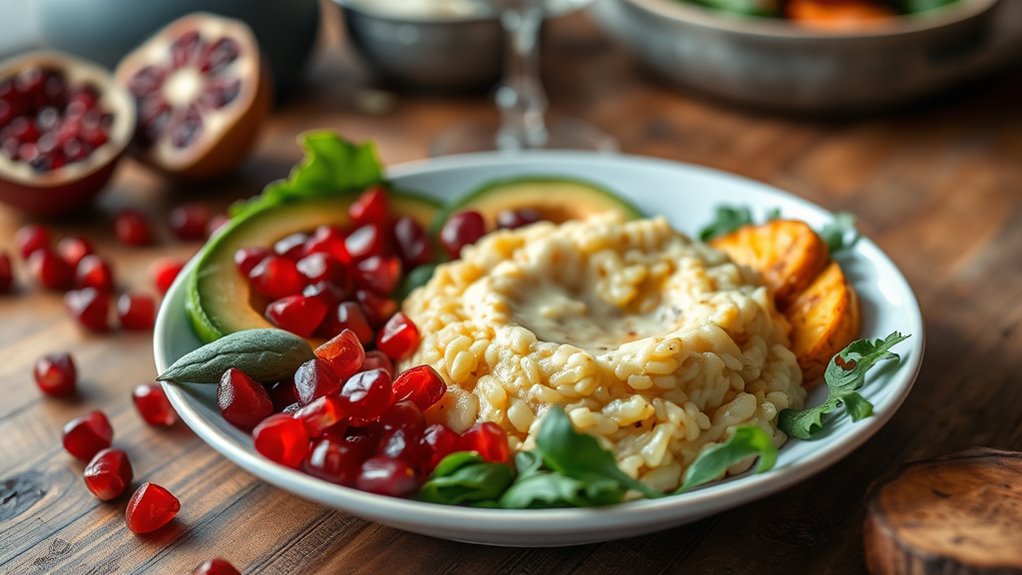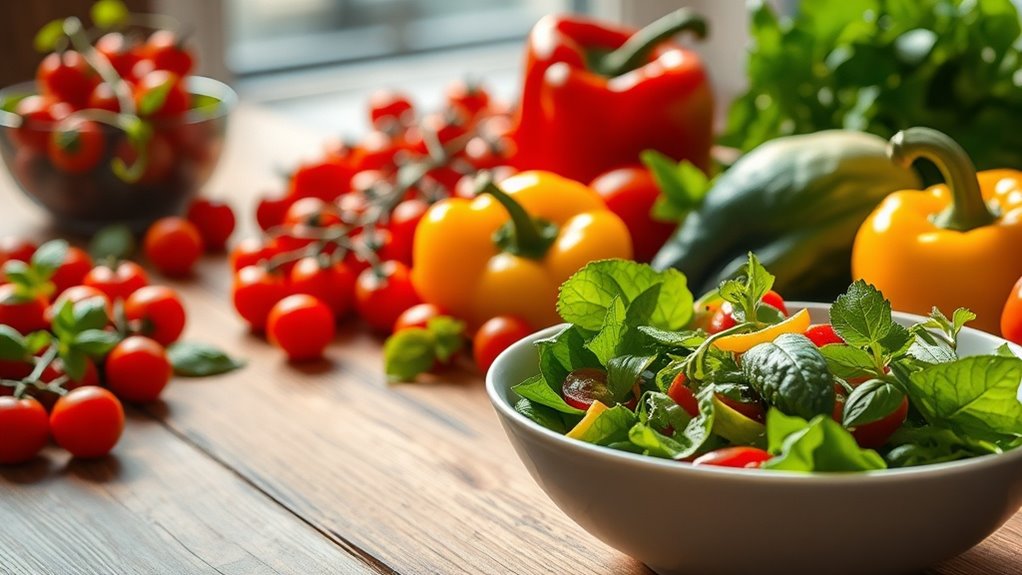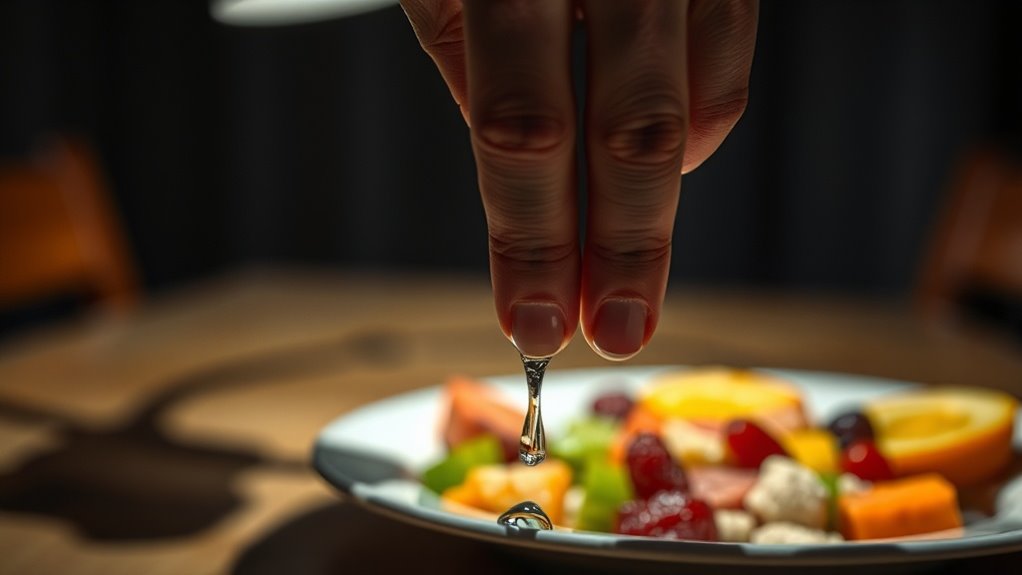Emotions on a Plate- Why What You Eat Isn’t Just About Food
Have you ever noticed how a warm bowl of soup can lift your spirits or how certain dishes evoke memories of home? The connection between food and your emotions runs deeper than you might think. It’s not just about satisfying hunger; it’s about the complex interplay of flavors, memories, and even nutrients that shape your mood. Understanding this relationship can reveal surprising insights into your emotional well-being and choices. What if your plate holds the key to deeper feelings?
The Connection Between Food and Mood
Have you ever noticed how a comforting bowl of soup can lift your spirits on a cold day?
It’s fascinating how food and emotions intertwine, shaping our moods and experiences.
When you savor a warm meal, your brain releases feel-good chemicals, like serotonin, which can ease stress and anxiety.
Think about it: your favorite dish might evoke cherished memories, creating a sense of belonging and warmth.
This connection highlights how what you eat isn’t just about nourishment; it’s about emotional fulfillment.
Understanding this bond can help you make mindful choices, enhancing your well-being and nurturing your emotional health through food. Additionally, studies show that certain foods can influence mental well-being, which underscores the importance of our dietary choices.
Comfort Foods and Emotional Healing
Comfort foods serve as more than just a meal; they can act as a balm for emotional wounds.
When life feels overwhelming, these familiar dishes provide a sense of safety and nostalgia, helping you navigate through tough times.
-
The warm embrace of homemade mac and cheese, melting away stress.
-
A rich chocolate cake, offering a moment of pure indulgence and joy.
-
A bowl of hearty chicken soup, evoking memories of care and warmth from loved ones.
These foods remind you that it’s okay to seek solace in what nourishes your soul, fostering emotional healing in every bite. Additionally, by incorporating nutritious ingredients into these comforting meals, you can enjoy them without guilt while still satisfying your emotional cravings.
Nutritional Psychology: The Science Behind Eating
How does what you eat influence your emotions and mental well-being?
The connection between nutrition and psychology is profound.
When you consume foods rich in omega-3 fatty acids, for example, you may notice improvements in mood and cognitive function.
Conversely, a diet high in sugar can lead to mood swings and anxiety.
Nutritional psychology examines how vitamins, minerals, and neurotransmitters affect your brain chemistry.
Understanding the role of stress eating can help you recognize emotional triggers that lead to unhealthy food choices.
By understanding this interplay, you can make informed choices that bolster your mental health.
It’s not just about nourishment; it’s about cultivating a balanced emotional state through the foods you choose to eat every day.
Cultural Influences on Food and Feelings
When you think about the meals that bring you joy, it’s often tied to your heritage and the traditions passed down through generations. Family gatherings and cultural celebrations create a tapestry of flavors and emotions, weaving together memories that shape your identity. However, these emotional connections can also trigger hidden influences that lead to emotional eating, making it essential to recognize and manage these patterns for healthier relationships with food.
Heritage and Tradition
Nostalgia often seeps into our meals, intertwining the flavors we savor with the memories of our heritage and traditions.
Each bite can evoke feelings of connection, grounding us in our roots. Think about:
-
The warmth of spices that remind you of your grandmother’s kitchen.
-
The vibrant colors of a dish that reflect your culture’s festivals.
-
The unique aromas that transport you back to family gatherings.
These culinary experiences shape your identity, influencing how you feel and connect with others.
Embracing these flavors not only nourishes your body but also your soul, reinforcing the bonds that transcend time and space.
Family Gatherings
Family gatherings often serve as a vibrant tapestry where cultural influences weave through every dish served. Each meal evokes memories, emotions, and connection, reflecting your family’s unique heritage. The flavors, textures, and aromas can transport you back to cherished moments, uniting generations.
| Dish | Cultural Influence | Emotion Evoked |
|——————–|—————————-|————————|
| Spaghetti & Meatballs | Italian Tradition | Comfort & Nostalgia |
| Tacos | Mexican Heritage | Celebration & Joy |
| Sushi | Japanese Culture | Calm & Serenity |
| Curry | Indian Roots | Warmth & Togetherness |
| Roast Turkey | American Thanksgiving | Gratitude & Love |
Cultural Celebrations
How do cultural celebrations shape our emotional landscapes through the food we share?
These moments connect us, weaving joy and nostalgia into our lives.
The flavors and aromas evoke feelings tied to shared histories and traditions.
-
The spicy kick of curry during Diwali ignites warmth and togetherness.
-
Sweet, sticky rice cakes at Lunar New Year symbolize prosperity and family unity.
-
The rich, savory smell of roast turkey on Thanksgiving brings back memories of gratitude and love.
In these gatherings, food transcends mere sustenance, embodying our collective identities and deepening emotional bonds.
Each bite serves as a reminder of where we come from and who we are.
Mindful Eating: A Path to Emotional Awareness
What if you could transform your relationship with food by simply paying attention to each bite?
Mindful eating invites you to savor flavors, textures, and aromas, helping you reconnect with your body’s signals. By slowing down, you learn to recognize emotional triggers that influence your eating habits. You might discover that stress or boredom drives you to snack mindlessly. This awareness fosters healthier choices and deeper self-understanding. As you cultivate mindfulness, you’ll likely find joy in your meals, leading to a more balanced emotional state. Ultimately, this practice empowers you to nourish both your body and your spirit, making it easier to adopt mindful eating habits that promote overall well-being.
The Role of Food in Celebrations and Traditions
Food often plays a central role in our most cherished gatherings and rituals, weaving itself into the fabric of celebrations and traditions.
Food is the heart of our gatherings, intertwining with our celebrations and traditions to create cherished memories.
It’s not just about nourishment; it’s about connection and emotion.
Think about the moments that resonate with you:
-
The aroma of freshly baked bread at family reunions.
-
The vibrant colors of a festive feast that spark joy and nostalgia.
-
The laughter shared over homemade dishes passed down through generations.
These experiences shape your identity, creating lasting memories and fostering bonds. Moreover, engaging in intentional eating during these moments enhances our awareness of the flavors and emotions tied to our meals.




